The Top Shelf: The Battle Royales 07: Nippon Ichi Software Strategy RPGs
By Mento 1 Comments
Welcome to The Top Shelf, a weekly feature wherein I sort through my extensive PS2 collection for the diamonds in the rough. My goal here is to narrow down a library of 185 games to a svelte 44: the number of spaces on my bookshelf set aside for my PS2 collection. That means a whole lot of vetting and a whole lot of science that needs to be done - and here in the second round, that means narrowing our laser focus to one game per week (at least). Be sure to check out the Case File Repository for more details and a full list of games/links!
Extra Note: We're down to the wire now, just a few loose ends to tie up. Specifically, figuring out which of two (or three) very similar games from the same franchise is the superior entry. Our strict one-game-per-franchise policy means we'll need to bring in some science to determine the truly shelf-worthy here in The Top Shelf's third round: The Battle Royales!
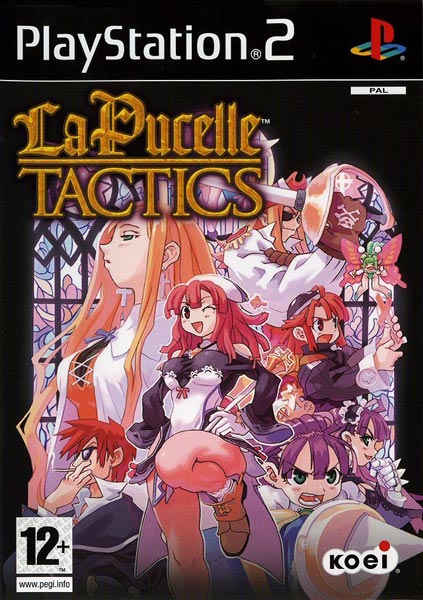
Well, here it is. The most contentious Battle Royale, for me at least, and easily the most populous. Today we're covering five strategy RPGs developed by Nippon Ichi Software: La Pucelle Tactics; Disgaea: Hour of Darkness; Phantom Brave; Makai Kingdom: Chronicles of the Sacred Tome; and Disgaea 2: Cursed Memories. I sadly ran out of time to complete Makai Kingdom, and I'm not entirely sure I ever completed Disgaea 2 for that matter, but I believe I've played a sufficient amount of both for the purposes of this feature. (Just to be on the safe side, though, "endings" are not one of the topics up for scrutiny this time around.)
In order to do this equitably, I'll be ranking all five games in order of quality for each of the three categories today. Using a standard scoring system - five points for first place, down to one point for fifth - we should have a clear victor after discussing all three categories in depth. Those three categories are as follows: Premise, which highlights the imagination of the game's setting and story; Characters, which honors the fact that the core appeal of these games are in their ensemble casts and the interplay between them; and Extracurricular Activities, which is simply a sesquipedalian way of saying stuff like the Item World and bonus dungeons, so often the "true" focus of these SRPGs once the story is over. Everything else - graphics, character customization, the turn-based combat, how the various rules work for their bonus treasure systems - are either identical or, in the case of the latter, too intricate to get into and ultimately kind of immaterial given that, say, La Pucelle's weird conveyor belts aren't really any better than Disgaea's geopanels or Makai's map extensions.
Premise
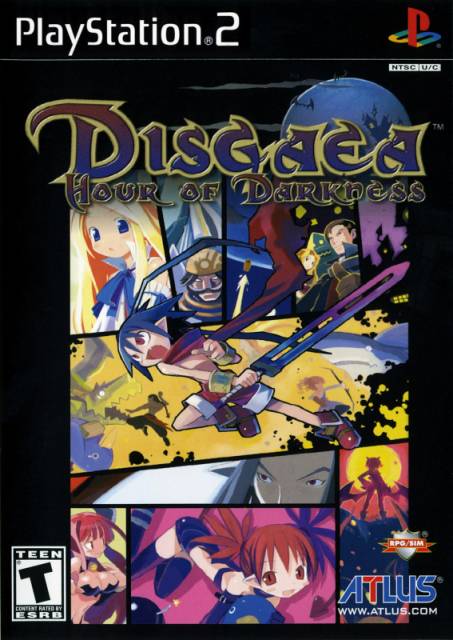
One thing that is important to note about the NIS SRPGs is their irreverence for their genre: this leads to a lot of knowing meta humor, especially in the Disgaea series, but it also means the developers are acutely aware of common genre clichés and work to avoid them. That extends to coming up with imaginative and unconventional ideas for settings and heroic protagonists. You might even say they're the Pixar of anime SRPGs, if you were feeling saucy.
La Pucelle Tactics, named for Joan of Arc, is a story about the impossible purity and grace of a female warrior chosen by God to save the world... but our protagonist, the buff and impulsive Prier, is not her. Prier seems somewhat aware of this, but is still determined to prove her worth by kicking demons very hard in the face for the better good; it's less about the role you were born for but the role you worked yourself to the bone to earn. In many ways La Pucelle has the most conventional RPG story of this five beyond its chosen one subversion, but it features a few entertaining substories like the air pirate Homard and his crew of corsair cats and the enormous but ultimately friendly whale monster.
Disgaea: Hour of Darkness introduces us to the Netherworld and the bickering demons who rule it. Specifically, it's the previous King's imperious and violent scion Laharl, who is awoken from his slumber after multiple assassination attempts and is forced to take back his Netherworld from the many demon pretenders that have been fighting over it since he went into his prolonged stasis. Laharl's an unrepentant monster, hilariously so, but gets his first taste of empathy from an obnoxiously cheerful angelic would-be hitwoman and slowly develops a conscience, even while thrashing and insulting his subordinates into shape. Disgaea's loose structure - find all the mutinous vassals and whup their keisters - means it can play with some very incongruous threads, from a useless Super Sentai parody team to a pack of space-faring heroes right out of a 1950s adventure serial.
Phantom Brave is probably the most humorless entry, since it takes a long time before its heroine - the phantom-summoning Marona - can find any kind of happiness. Her morbid powers, useful for bounty hunting, make her a pariah and she's lived alone since her parents died with only the spectre of their friend, Ash, to guide her upbringing. The tropical setting does nothing to mitigate the heartbreak of these early chapters, as Marona regularly weeps at her loneliness and frequent hate-mail, before eventually finding a few allies who recognize her good nature. It's a little macabre and depressing, but probably has the most heart out of any of these five.
Makai Kingdom takes the meta humor of Disgaea and ratchets it up even further, expanding on the concept introduced in Disgaea that Laharl's Netherworld is simply one of thousands: they all float in a metaphysical cosmos, where the Overlords frequently chat about the news and invade one another for fun. The strongest, at least according to him, is Lord Zetta: an Overlord so powerful he accidentally ends up destroying his own Netherworld and trapping his soul inside a fate-determining tome, relying on the fear and respect he has instilled in his fellow Overlords to help him rebuild - the reality, of course, is that the other Overlords see this as an opportunity to give him as much grief and torment as possible, and most of the game's humor is derived from that antagonism. It's funny, but fairly loose and rudderless even as far as the structure of these games go. Definitely the weirdest, though.
Disgaea 2 revisits the Netherworlds once again for the story of Adell, a demon-hunter who was the only human not transformed in his village when an Overlord came calling, and Rozalin, the daughter of said Overlord. They have a contentious relationship right off the bat that eventually softens into something inevitable, but there's a few twists in the tale and some important roles for the characters from the first Disgaea, making it something like a true sequel even while being set in a whole different universe. I liked what I saw of its story just fine - I think I was about 70-80% of the way through before burning out - but I can't say it was a highlight.
So, my rankings for premise - which takes into account both the ingenuity of its setting and how the games' stories are structured - are as follows:
- Disgaea: Hour of Darkness
- La Pucelle Tactics
- Phantom Brave
- Disgaea 2: Cursed Memories
- Makai Kingdom
Characters
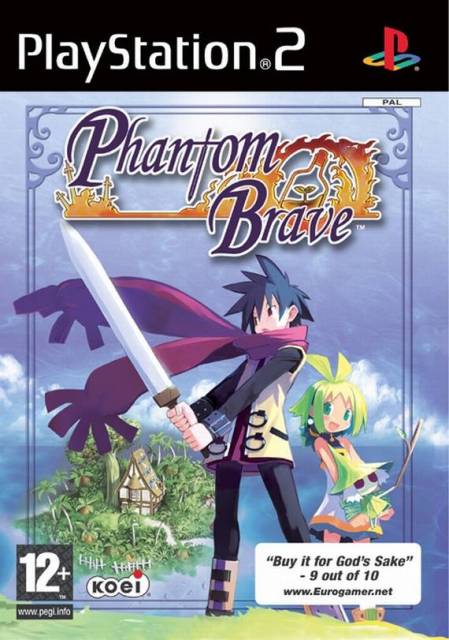
The secret to any good comedy is a strong ensemble cast with no weak links in the chain: characters that aren't always on the same page who can act as foils to one another. It's also important that the main characters are all at least a little bit sympathetic, if we're spending any amount of time with them, and that they're distinctive, often have motivations of their own, and play significant parts in the story. The exception are the many single-use joke characters and other cameos, which feature heavily in these games.
La Pucelle's main ensemble consists of the reckless priestess Prier, her dorky younger brother Culotte, the annoyingly perfect Alouette, and the demon-hunting cool guy mercenary Croix. Filling out the ancillary cast are Homard the air pirate, Eclair the princess with a dual personality, and Father Salade, the priest who trained Prier and might be the only person stronger in hand-to-hand combat than she is. It's a solid if typical bunch, with the best character moments coming from Prier's increasingly complicated role in the ongoing legend of the Maiden of Light and the Dark Prince, and her eventual (apparently canon) acquisition of godlike powers from spending too long staring into the abyss.
Disgaea has a primary trio - Laharl the Overlord-to-be, Etna his not particularly loyal servant, and Flonne the chirpy divine assassin - but the game gets its best laughs from the characters they meet, from Vyers the Dark Adonis (renamed simply "Mid-Boss" by an unimpressed Laharl) to the Prism Rangers to Captain Gordon and his assistants Jennifer and Thursday the robot. You also have the adorable, interchangeable and expendable Prinnies, lost human souls forced to assume useless penguin bodies to atone for their sins, and the various denizens of Laharl's fortress, who like Etna mostly serve Laharl out of boredom, rather than out of any kind of fearful loyalty.
Phantom Brave's main cast really only consists of two people: Marona and Ash. You actually see the game through Ash's perspective most of the time, though it's Marona that the story focuses on and who leads the charge in every battle (as the only alive person). A few characters start popping up towards the mid- and late-game - most notably Walnut, a fellow "Chroma Hunter" (or bounty hunter) with a bad attitude and Castile, a sick girl who befriends Marona. It befits the loneliness theme that there aren't too many cast members around initially, besides for the occasional cutscene when Marona is given tasks to do outside of her island home, but it doesn't do the game any favors for this particular category.
Makai Kingdom's cast is comprised almost entirely of Netherworld Overlords: there's Zetta, who is transformed into a book and relies on his peers and underlings for most of the work; there's Pram, the mischievous Overlord who rose to prominence with her ability to tell the future; there's Valvoga, a "final boss" looking conglomeration of parts that consists of the toady Mickey, the devious Ophelia and the loud Dryzen; there's the sleepy colossal space dragon Babylon; the obnoxious Zetta rival Alexander; the idiotic and self-obsessed leonine King Drake; and various others who tend to pop up, provide the base characteristics for the next randomized dungeon for the player to conquer, and then either vanishes or is destroyed somehow. The revolving door of character appearances makes it hard to care about any of them beyond Zetta and Pram, but they're entertaining in their own way when they show up only to get lambasted by the rest of the cast. It can feel more like a sketch show at times.
Disgaea 2 is another game with a core cast of two - Adell and Rozalin - and then fills its banks with a huge ancillary crowd of goofs and foes. Of note is the annoying frog butler and frequent butt of jokes Tink, the samurai Yukimaru whose running joke is to threaten to kill herself after every perceived failure, Adell's younger siblings Hanako and Taro who both have a smart mouth on them, and Axel: a has-been demon rockstar who tries to defeat Adell to resurrect his career and keeps failing at it due to his own cowardice and incompetence. It's not quite as strong as Disgaea's collection of reprobates - I didn't care for Tink much - but maintains its meta, irreverent spirit.
So, my rankings for characters - which takes into account the appeal and strength of a game's core team of characters and how much fun the extended cast can be - are as follows:
- Disgaea: Hour of Darkness
- Makai Kingdom
- Disgaea 2: Cursed Memories
- La Pucelle: Tactics
- Phantom Brave
Extracurricular Activities
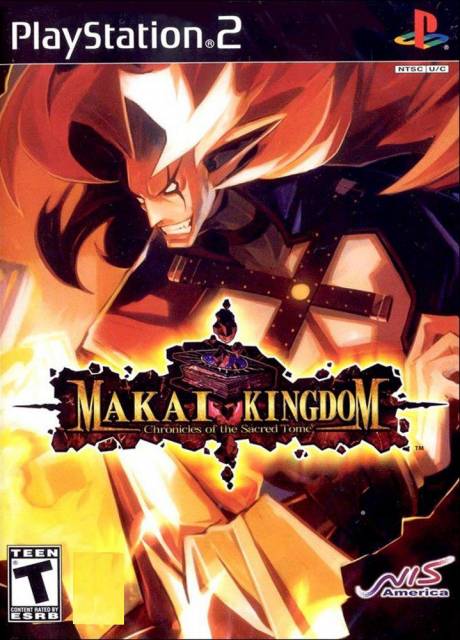
The core of the NIS strategy RPGs are the series of maps - some pre-generated, some procedurally so - that make up the game's story-critical missions, which often start or end with cutscenes that lead the plot forward or just has some fun at the expense of the next boss. However, the true soul of these games are in the myriad ways you can wander off and take part in optional dungeons, or some other means of powering yourself up for the travails ahead - or just go nuts and raise your level to the thousands to ensure you can stomp absolutely anything the story sends your way, up to and including foes which are meant to be insurmountable. This essentially boundless freedom to power-up and min-max to your heart's content is where the NIS games shine, even if they end up adding several 0s to the overall hour count for your playthrough.
La Pucelle: Tactics is the fairly unremarkable "Hell" dungeon: a dungeon with an endless number of floors with increasingly dangerous demons. You can come here at any point to train your team if they've been flagging against some of the more recent boss fights, but there's not a whole lot else attached to this dungeon story-wise, at least in the original version of the game. As if to recognize that their players were the type to descend into the underworld in pursuit of unimaginable power, not only did NIS base their next game on that notion but also made it the canonical fate of their heroine Prier: a demon-hunter that became so strong through rigorous training in the Hell dungeon that the demons made her their new Overlord. Whether she's a ruthless Overlord or a benevolent one is up in the air, however...
Disgaea's where we see NIS fully embrace the overpowered lunacy of their optional content, inventing not only the Item World - a series of dungeons created from objects in your inventory which can be used to power them up, as well as power up any characters fighting through its many floors - but the Dark Assembly, in which the player takes on the demonic equivalent of Congress in order to push through their wild new laws, which can range from increased quality goods in stores to high-level maps that contain secret characters to unlock. The more potentially dangerous the law, the harder it is to pass, but it's surprising how pliable the congress monsters become if you just beat them up a little - and if they should happen to die, well, that's one less vote opposed.
Phantom Brave has an interesting random dungeon system that effectively takes on prefixes the player can acquire in the main game - these are usually attached to characters and items, and can boost or diminish certain stats depending on the term ("weak" is rarely good, for example) - and attaches them to dungeons also, which changes the type and levels of enemies you'll face and the items you can expect to find. It gives you some customization options for these dungeons, but they're otherwise fairly plain.
Makai Kingdom has a similar system, where you spend currency to create dungeons to your liking, and work similarly to those in the main game where you have a "sponsor" that affects the enemy types, floor size, and difficulty. Lots of customization, but they aren't all that interesting unless you're really adamant about power-levelling.
Disgaea 2, not surprisingly, brings back all the optional content of Disgaea with some additional upgrades to its Item World and Dark Assembly modes. It also introduces the Dark World, which takes the maps from the story mode but gives them tough new enemies and a "Dark Sun" that generates any number of negative conditions from status effects to an instant game over if you're not fast enough. The points it loses for a lack of imagination is easily regained by what it adds to those extant systems.
So, my rankings for extracurricular activities - which awards points for depth, variation and how compelling they are to the extent that you lose whole months of your life - are as follows:
- Disgaea 2: Cursed Memories
- Disgaea: Hour of Darkness
- Phantom Brave
- Makai Kingdom
- La Pucelle: Tactics
Conclusion
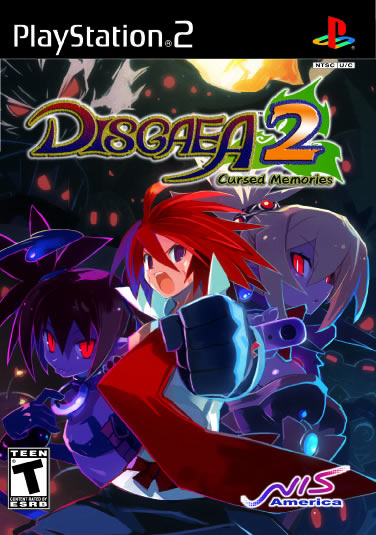
I figured going by a ranking system would make this race a little closer, but I didn't quite anticipate that the first Disgaea would sweep the thing. It's definitely the first game where I really understood what NIS were going for in their games, both in terms of humor and structure, and it's a big part of the reason why there's like seven or eight Disgaea games now, and why Laharl, Etna and Flonne keep appearing in them. I admire NIS for taking the time to explore other venues and ideas during the PS2 era, something they've done less often with the PS3 and beyond, but Disgaea was plainly their best attempt and the universe they've continued to build on.
The results are clear enough: Disgaea: Hour of Darkness proceeds directly to the shelf, as the system's unofficial best strategy RPG, and La Pucelle Tactics, Phantom Brave, Makai Kingdom and Disgaea 2: Cursed Memories are all eliminated. It hurts, but given that these games are effectively endless I probably only need the one.
And that's going to do it for the Battle Royales. We've settled a lot of hashes, squashed a lot of beefs, smoothed over some conflicts, and now the shelf is almost complete. There's just a small case of some last-minute homework, some soul-searching, and some tweaks to this list of reserves before I'm ready to roll out the red carpet for the forty-four "shelf-esteemed" on the 26th: the last Tuesday of the year. Get ready for some closure, my sweet Shelf Supporters, and I'll see you again very soon.
